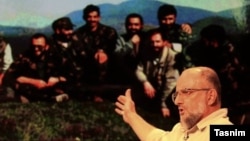Iran's Islamic Revolutionary Guard Corps (IRGC) on April 17 denied the veracity of remarks by one of its former generals who has claimed to have worn Iran's Red Crescent Society's (IRCS) uniform for "military purposes" during the civil war in Bosnia.
Saeed Qassemi (Ghasemi), a retired IRGC general, is an outspoken ultraconservative, renowned for his vitriolic attacks on reformist former President Mohammad Khatami and the incumbent "moderate" President Hassan Rouhani.
In an interview with the state-approved internet channel, Aparat, Qassemi maintained on April 14 that he had visited Bosnia in the 1990s to train Bosnian Muslim fighters against the Serbs while wearing the Iranian Red Crescent uniform.
In the same interview, Qassemi admits that he is divulging the fact since the Americans had already discovered the ruse and written about it.
'Devoid of credibility'
IRGC's spokesman, Ramazan Sharif, dismissing Qassemi's remarks said, "Mr. Saeed Qassemi's remarks, who for a while was in Bosnia voluntarily and has retired a long time ago, are his personal views, devoid of credibility and are not shared by the IRGC," according to ISNA.
An hour after the IRGC statement, President Hassan Rouhani's office also dismissed Qassemi's remarks, saying that his claims help "the enemy".
Qassemi's remarks come just days after the U.S. State Department listed the IRGC as a "Foreign Terrorist Organization," accusing it of supporting militant groups around the world.
The Iranian Red Crescent has also officially dismissed Qassemi's claims and has threatened to sue him. "If an individual or a state entity has used the logo or uniform of the IRCS for operations against the aims and principles of the International Red Cross Society, it definitely happened without the permission of the IRCS or in coordination with it," IRCS announced.
Even if the IRCS permission was sought, the statement argues, it would have never been given.
"Based on the four conventions ratified in Geneva, the IRCS is impartial in armed conflicts since it has the important responsibility of supporting the humanity, and the civilians," the statement has insisted.
In his interview with Aparat, Qassemi, 59, revealed information concerning the presence of the Islamic Republic armed forces in Bosnia that might place the IRCS and the Islamic Republic in a tough position.
'Side by side with al-Qaida'
During the interview, the former IRGC commander boasted about his role and that of his comrades in the Bosnian civil war, while they were wearing the IRCS uniforms.
"In Bosnia, in the heart of Europe, there were many developments. We were side by side with al-Qaida. The members of al-Qaida learned from us. From all over the world, mujahedeen poured into Bosnia, and there was a new development. Muslim jihadi units were established," Qassemi maintained.
Referring to CNN reporter Christiane Amanpour, who is of Iranian descent, Qassemi said that she was the person who found out about their deception.
"This fellow compatriot of ours [Amanpour] — who all of our politicians, including [ultraconservative former President Mahmoud] Ahmadinejad to [President Hassan] Rouhani, love to give her interviews — this dishonorable spy of the CNN, gave us away."
Qassemi's comments were followed by a harsh reaction from the IRCS on Twitter, dismissing the remarks as unfounded.
Moreover, the IRCS says that it has filed a complaint against Qassemi for his controversial comments.
Support for Bosnian Muslims
In the 1990s, the Islamic Republic widely supported Bosnian Muslims in their conflict with the Serbs and Croats. The support was orchestrated by Ayatollah Ahmad Jannati, a mid-ranking cleric currently presiding over two authoritative bodies in Iran, the Council of Guardians and the Assembly of Experts.
To assist the Muslim Bosnians, Tehran launched a Bosnian-speaking radio station, and later a TV channel, called "Sahar" ("Dawn").
Meanwhile, the Bosnian war helped the IRGC's extraterritorial arm, the Quds force, to expand and gain power.
Qassemi is an Iran-Iraq war veteran who has turned into a political activist after retiring from his position in the IRGC. Notorious as a short-tempered person who loves to use vituperative words, he is one of the leading orators at the Iranian Hezbollah gatherings and assemblies.




